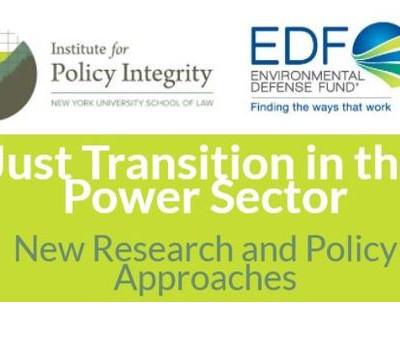October 31, 2021
October 2021 at Policy Integrity
- Switching Off Appliance Emissions
- Shaping the Fleet of the Future
- Symposium on Cost-Benefit Analysis
- Charting Paths for a Just Energy Transition
- In the News
- More from October 2021
-
Switching Off Appliance Emissions
The fossil fuel-powered appliances in most residential and commercial buildings collectively emit almost three times more smog-forming nitrogen oxides than the nation’s gas-fired power plants and almost as much planet-warming carbon dioxide. Yet appliance emissions have not yet been regulated by the EPA, even as the agency has regulated power plant emissions for decades.
Our new report, written with law students from our Regulatory Policy Clinic, finds that EPA has authority under Section 111(b) of the Clean Air Act to set nationwide performance standards for new residential and commercial fossil-fuel appliances. The report highlights promising regulatory approaches, including the use of emissions averaging and trading across manufacturers’ appliance fleets. Politico’s E&E News and Inside EPA recently ran articles on our report.
-

Shaping the Fleet of the Future
Agencies from the National Highway Traffic Safety Administration (NHTSA) to the Postal Service are shaping the future of transportation. This month, Policy Integrity submitted comments on NHTSA’s proposed car standards, suggesting ways to improve its modeling to better calculate the costs and benefits of policy options and address market failures.
We also submitted comments on the Postal Service’s draft environmental impact statement for its plan to acquire up to 165,000 delivery vehicles over the next decade, at least 10% of which will be battery electric vehicles. We suggested ways the Postal Service should extend its analysis, including by accounting for the public health and environmental costs of local pollutants and the potential benefits of placing cleaner vehicles in the most pollution-burdened environmental justice communities.
-
Symposium on Cost-Benefit Analysis
What is the right role for regulatory cost-benefit analysis (CBA)? Leading administrative law scholars published more than a dozen perspectives on this question for the Yale Journal on Regulation’s symposium, which centered on our director Richard Revesz and co-founder Michael A. Livermore’s book Reviving Rationality: Saving Cost-Benefit Analysis for the Sake of the Environment and Our Health (Oxford University Press, 2020). The commentators explored many facets of CBA’s policy applications, and how it could be improved to better account for distributional concerns. In their response, Revesz and Livermore reflected on some of the commentators views, noting a complete lack of support for the Trump administration’s approaches even from a politically diverse group. They concluded that the future of CBA will become clearer when the Biden administration updates the guidance for regulatory impact analyses and agencies begin issuing more major rulemakings.
-
Charting Paths for a Just Energy Transition
Energy justice researchers and policy experts came together to discuss what a just energy transition could look like at a webinar co-hosted by Policy Integrity and the Environmental Defense Fund. The panelists discussed policy options to bridge the income gap in solar energy adoption and ways to transform defunct fossil fuel infrastructure to support transitioning workers and renewable energy expansion. The recording is available here.
This webinar is part of an ongoing series highlighting research funded by the Sloan Foundation in the electricity transmission and distribution space, so stay tuned for upcoming events!
-

In the News
Policy Integrity’s insights are shaping national conversations on climate and energy policy. Senior Attorney Justin Gundlach’s perspective on energy resilience was highlighted in the Washington Post, as he called for state public utilities commissions to recognize and plan for climate impacts to the electricity grid.
Speaking to E&E News, Richard Revesz encouraged EPA to adopt a whole of government approach to reforming the power sector—rather than the more typical one-at-a-time rulemaking—to reduce the cost of the regulation and increase environmental benefits.
-
More from October 2021
We submitted comments to:
- BLM on its review of federal coal leasing, its oil and gas leasing in the Arctic National Wildlife Refuge, and an application to drill for oil on federal lands.
- DOE on its proposed energy efficiency standards for manufactured housing and its interpretive rule for gas furnaces and water heaters.
- FERC on its proposed transmission reform; our comments were cited in an S&P Global article.
- NRC on its approach to addressing environmental justice.
We filed joint comments with the Colorado PUC on RTO membership, and Justin Gundlach served on the Virginia Energy Storage Task Force, which submitted its final report to the legislature.



